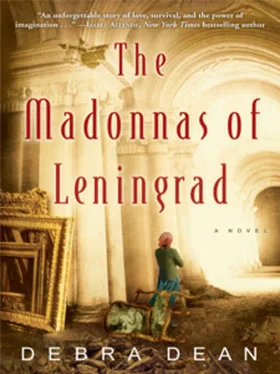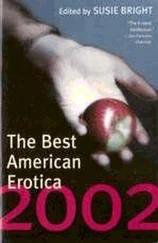Tonight, though, there is only bread. Marina disciplines herself to wait until Uncle Viktor finishes a page and has thumbed to the next sheet before she allows herself another nibble. Between bites, she tries to train her mind away from the bread and back to the lecture. She and Nadezhda are a test audience, charged with the thankless task of responding as they imagine a real audience of soldiers might. Before he began to read, Viktor suggested that they pretend they know nothing about Urartian culture.
“Understand that this was originally composed with a scholarly reader in mind. While I believe I’ve adjusted the text of my manuscript sufficiently to accommodate a general audience, there may be references here and there that need further elucidation. Naturally, I’m receptive to any suggestions.”
This last part is not precisely true. Earlier, Marina made the mistake of offering a small suggestion about a turn of phrase that seemed unnecessarily stilted to her and might be improved by the substitution of the word begin for commence . Viktor treated her to a long discourse defending the propriety of his wording, noting that commence had a tone more suitable to the solemnity of the occasion.
“One might begin doing a household chore,” he intoned, “but we are not talking about laundry here but rather the excavation of a culture.”
And then he started the lecture over from the beginning.
The story of Urartu might be told as a compelling mystery story. There once was a powerful kingdom that ruled over the Caucasus for three centuries and then vanished completely from history. Only in the last few decades has it been rescued from oblivion, its temples and fortresses unearthed, its language transcribed, an entire culture that was buried for twenty-five centuries brought back to the surface.
However, Viktor’s description drains the excitement from his subject, substituting detailed exposition of the digs and a painstaking analysis of sociological formation. Some of the leadenness is due, no doubt, to the scientific rigor of his discipline. The rest could be attributed to political necessity. Viktor Alekseevich Krasnov’s version of Urartian culture is dutifully and remarkably prescient of Marx. In this, Marina thinks, his writing is no different from any other piece of writing for public consumption. There is rarely an original thought that isn’t smothered under the deadening weight of Marxist theory. Take the museum guides’ official tour script. If visitors had to navigate the picture gallery upstairs with only this document, they would quickly get lost. This script, which Marina and the other guides have memorized and recite verbatim, translates an innocently frothy portrait by Watteau into “a picture of decadent bourgeois privilege in the disintegration of feudal society.” Or turn to the entry for Cranach the Elder’s exquisite Madonna. The painting is as exotic as a tango, all gorgeous reds and oranges, the sensuous drape of velvet and satins, the Madonna’s spiraling hair, and the wonderful apples hanging over her head like planets, a crown of glowing planets. In the official text, though, all this is reduced to an “instructive religious artifact from the Teutonic cult of Mary.” Marina sometimes will conveniently forget the worst of her script when she is guiding her tours and just let the paintings speak for themselves, but Viktor would never contemplate such a dangerous omission. Having barely survived the purges that decimated the Archaeology Department, along with much of the intelligentsia of Leningrad, he has since grown fluent in the language of the Party.
Even Viktor, though, seems to sense how far short of entertainment his lecture is falling. As he is recounting the laborious process by which language scholars have begun deciphering the various cuneiform inscriptions, he stops midsentence. He runs his finger down the page, murmurs, “Well, perhaps we may dispense with some of this,” and skips to the next page. It is only nearing the finish that Viktor leaves the track of his original manuscript and bends to the upcoming occasion. “It may seem,” he says, looking past Marina and Nadezhda to address an imaginary gathering, “that the fate of a long-dead culture is far removed from the present concerns of the valiant soldiers gathered here tonight. And yet, if we may conclude anything from the fate of Urartu, it is that feudal systems of oppression are eventually defeated and forgotten. When future archaeologists unearth the forgotten ruins of Fascist Germany”-Viktor pauses to clear his throat, and Marina is startled to see his lower lip quivering with suppressed emotion-“surely,” he continues, “surely, comrades, they will be astonished at the vainglorious claims of a Thousand Year Reich.”
Nadezhda claps her hands enthusiastically. “It is inspired, Viktor,” she says. “They will be on their feet.”
“Yes, Uncle. They will certainly be impressed,” Marina concurs.
“In fact,” Nadezhda adds, “I would be surprised if you are not given a supplemental fee.”
“What do you mean?” Viktor’s voice is suddenly sharp.
“I mean something beyond the four hundred grams of butter. Out of gratitude.”
“Haven’t I told you I will bring back what I can? Can you think of nothing but your damned sweets?” Slow starvation has carved the contours of his face into hard bones and made his glare even more stern. “I share my ration with you, even though you are entitled to less, but still you torment me with this incessant ranting.”
Nadezhda has been plotting all week what they will make with the butter. Without work to distract her, she talks of nothing else, circling fixedly around her limited options. They have no flour, but she has squirreled away a few pieces of the blockade candy that could be melted down to make shortbread. And if only they had a bit of jam. She has pestered Viktor repeatedly about trading away the vodka.
Now she pouts. “It’s easy for you to mock me. You will be feasting tomorrow night while Marina and I eat nothing but bread.”
Viktor explodes, not caring that his voice echoes off the frozen walls of the vault and carries through the shelter.
“This is my life’s work, Nadezhda. If I die, this is my legacy to the world.”
“Yes, it is all that matters to you anymore, this book. You don’t even care anymore what has become of your own children.”
She is not prepared for the blow, and it knocks her back onto the pallet. She sits down hard but doesn’t react. Mutely staring at the wall of carpets, she seems oblivious to the hoarse whispers coming from the other side.
Viktor too is stunned. He mumbles something incomprehensible and then sinks down at the foot of the pallet, his head in his hands.
Marina watches him guardedly from her corner. He is not a violent man, in fact he prides himself on his self-control, but hunger has eaten away the veneer of civilization, and people are not themselves. She has heard terrible things. In the cellars, she hears mothers beat their hungry children when they cry. In the bread lines, young boys rip the bread from the hands of feeble women, and there are rumors of missing children and black market sausage. Liliia Pavlova told her last week about a corpse on the street with its buttocks carved out.
Viktor stands up and trudges to where the candle has been left burning. He blows it out, and Marina hears him cross back to the pallet he and Nadezhda share. He murmurs to his wife, telling her to lift her legs, to get under the blankets. As silently as possible, Marina crawls under her own mountain of blankets and disappears under its comforting, muffling weight.
She wakes up in the night, crying.
“ Izvinite ,” she is whimpering. I’m sorry. When Dmitri reaches over and touches her back, she flinches and jerks away. “I can’t help you,” she snaps in Russian.
Читать дальше












